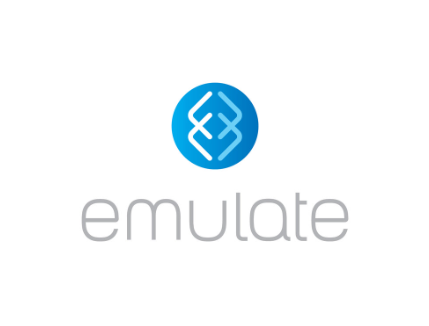QM+Emulate Organs-on-Chips Centre
Emulate provides both closed channel (S1 and R1) and open chamber chips (A1). The platform may be used to develop new models or run existing Emulate Biokits. Models developed/used at Queen Mary include: Liver, Kidney, Intestine, Airway and Alveolar, Synovium, Cartilage, Tendon, Bone, Bladder, Artery, Blood Brain Barrier, Breast Cancer Bone Metastasis and Ovarian Cancer Metastasis.
This video shows the basic structure of the Emulate Chip-S1® with the two microfluidic channels enabling cell-cell communication and migration across the porous membrane and with simultaneous physiological biomechanical stimulation in the form of tensile strain.
Emulate Organ-Chips
Emulate's original organ-chip, the Chip-S1®, comprises a top and bottom channel separated by a porous membrane that allows for cell-cell interaction like those that occur in vivo. These two channels are fluidically independent. To generate the different models each channel is coated with organ- and cell-specific extracellular matrix proteins (ECM). The larger top channel is seeded with cells in either 2D and 3D configurations. The smaller bottom channel is typically seeded with endothelial cells to represent vascular interaction, however it too can be seeded with other cell types or left empty as required.
Emulate have now launched a new varient Chip-R1®, Rigid Chip. This is based on Chip-S1® but designed to minimize drug absorption using low-drug-absorbing plastics. In addition the modified design of the bottom 'vascular' channel enables more physiologically relevant levels of shear stress, which is critical for vascular biology applications such as immune cell recruitment. Additionally, this model features a thinner membrane with smaller pores aimed at enhancing cellular crosstalk.
Emulate's new accessible chip format, Chip-A1®, allows researchers to model complex 3D tissues by incorporating gels up to 3 mm thick within the chip’s accessible culture chamber. Media flows over the top surface of the chamber whilst a separate vascular channel is provided at the base. Like the Chip-S1®, the A1 can also be subjected to controlled mechanical stimulation.
Zoë, Orb and Pods
The Zoë™ Culture Module is designed to sustain the life of cells within Emulate’s Organ-Chips. It provides the dynamic flow of media and the mechanical forces that help recreate the microenvironment cells experience in vivo. The instrument automates the precise conditions needed for simultaneous cell culture of up to 12 Organ-Chips. Zoë enables independent control of the flow rate of media through the top and bottom channels of the Organ-Chips, as well as stretch requency and amplitude of the Organ-Chip. Additionally, Zoë has automated algorithms to prime the fluidic channels of Pods with media, and programming to maintain the culture microenvironment for optimal cell performance.
The Orb™ Hub Module is a central hub that connects to up to four Zoë™ Culture Modules. It provides a simple solution for installing and operating the Human Emulation System® within the lab environment. The Orb delivers a mix of 5% CO2, vacuum stretch, and power from standard lab connections. It generates a 5% CO2 supply gas to Zoë by combining air with an external 100% carbon dioxide supply (or from a portable CO2 canister for increased flexibility) in a controlled mixture. Orb also generates the vacuum required to apply Organ-Chip stretching (-70 kPa) and contains four individual power ports.
The Pod™ Portable Module houses the chip, supplies media, and enables compatibility with microscopes and other analysis equipment. The Pod, which has a height of 41.5 mm, is designed to allow Organ-Chips to be easily transported and placed on standard microscopes for imaging. It also allows simple portability of Organ-Chips between our hardware and other analysis equipment. The Pod's reservoirs allow users to introduce nutrient media or blood, precisely control dosing to test drugs or other inputs, and sample chip effluent. Each Pod reservoir holds up to 4 ml.
.jpg)
For enquiries about the Queen Mary + Emulate Organs-on-chips Centre, please contact: Prof Martin Knight
For quotes and technical information, please contact: Stephan Schuell, Emulate's Business Development Executive



